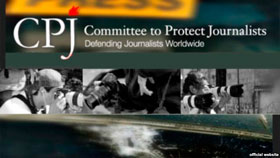Belarus considered to be one of the most censored countries
Committee to Protect Journalists listed Belarus among the ten most censored countries on the globe, along with Eritrea, North Korea, Syria, Iran,
Equatorial Guinea, Uzbekistan, Burma, Saudi Arabia and Cuba. Interestingly, Belarus is the only European country on the list.
According to CPJ, President Aliaksandr Lukashenka presided over one of the world's most
censored nations, continuing policies that sought to suffocate critical
journalism and dissenting opinion. At least four reporters, all of them
known for critical coverage, were barred from traveling outside the country in March. Another four reporters were jailed during the year, while numerous others faced threats, harassment, fines, and assaults.
The government's repressive practices were illustrated by its harsh
reaction to a Swedish ad agency stunt in which hundreds of teddy bears pinned with press freedom slogans were airdropped over the country. The KGB jailed one reporter who covered the stunt, and interrogated and fined two others who published photos and stories about the airdrop. The episode led to the sacking of top army generals and a foreign minister, along with the expulsion of the Swedish ambassador. The country grew increasingly isolated during the year. In February, the government expelled
Polish and European Union ambassadors after the EU widened travel bans
against Belarusian officials due to the country's human rights failures.
Lukashenko himself was subjected to an embarrassing travel restriction:
He was barred from the 2012 Olympic Games in London because of an EU
travel ban imposed after Minsk harshly cracked down on election protests
in December 2010. In September 2012, the country's parliamentary
election was marred by reports that election officials obstructed
opposition candidates seeking to register, that state-controlled media refused to grant opposition candidates equitable coverage, and that the KGB cracked down on online activists. Throughout the year, critical media--both local and international--faced domestic blocking online, denial of accreditation, and distribution hurdles.


















